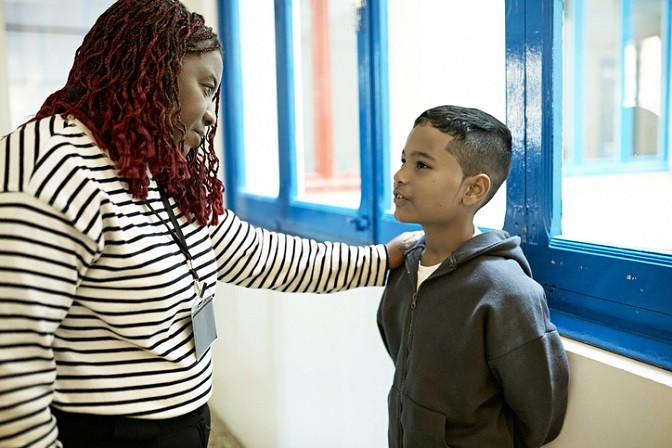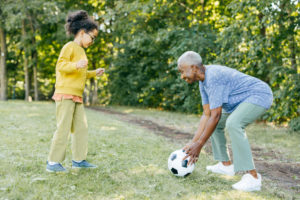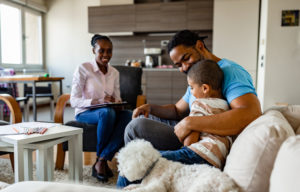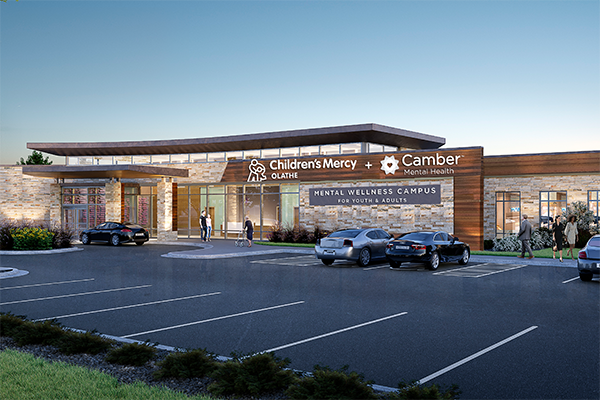How to Help Kids Cope with Grief and Loss

Gaining the skills to cope with grief and loss can make a tremendous difference in facing life’s challenges. As a caregiver or trusted friend, you can help children learn how to process difficult losses and painful experiences in healthy ways. As you share and role model how to cope, you can help young people move forward from loss and pain with resilience and perspective.
What kind of grief do children and teens experience? What skills and tools can you give them to manage grief? Keep reading to prepare the youth in your life to experience and move through these challenging emotions.
What is Grief?
Grief is defined as the natural reaction that comes with loss. Everyone expresses this emotion differently and grief may look like sadness, numbness, depression, anger or other challenging feelings.
We often think of grief within the context of losing loved ones, but people can grieve due to a wide variety of losses. What might children grieve? Tough experiences that may trigger this feeling include:
- Passing of a family member or friend
- Family changes amid separation or divorce
- Death of a beloved pet
- Milestones missed (for example, during COVID-19)
- Changes in caregiver situations
- Losing a friend who moves away
In light of an event that may trigger grief, caregivers and loved ones can monitor how children respond and teach coping skills as needed to help them through the experience.
What Does Grief Look Like for Kids?
How a child goes through grief following loss depends greatly on age. As their understanding of death and loss changes, so does their response. With an awareness of what a child might be feeling, caregivers and friends can provide aid and comfort in a powerful way.
How Toddlers and Preschoolers May Experience Grief
A common response to grief for those under age five is asking many questions. These young children may also worry about the same thing happening to themselves or another loved one. For example, if a grandparent passes away, they may feel concerned that something similar could happen to a parent or caregiver. Giving simple, clear answers to all questions can help a child begin to understand the situation and feel supported during this difficult life experience.
Common reactions to loss in young children include changes in sleeping or eating patterns, changes in play and separation anxiety. Children at this age may also not fully comprehend the situation’s permanence, so they may continue to ask for who or what is gone.
How Elementary-Age Children May Experience Grief
Once children understand more of the permanence of loss, their reactions may change. At this stage, anger and frustration can be common reactions. Children may also feel sadness for extended periods.
Elementary-age kids who have experienced loss may experience nightmares, increased neediness and other less-mature behaviors. Grief can also be expressed through tantrums or anger, and adults may see young people participate in more aggressive play or seem irritated with family members.
How Teens May Experience Grief
With greater knowledge of the dangers in life, teenagers may feel overwhelmed and scared when they experience loss. This can cause teens to feel out of control and make reckless choices.
Caregivers and trusted friends should watch for signs of substance misuse and other dangerous behaviors. More common are reactions of irritability, fatigue, withdrawal from friends and activities, frequent headaches or stomach aches and difficulty in school. Grief can also trigger greater severity in teens who already experience mental health concerns; for example, a teen who sometimes struggles with anxiety may find their anxiety worsens during a season of grief.
What are Strategies to Help Kids Cope with Loss?
Speak on The Child’s Level
When addressing loss and grief, it’s helpful to meet the child at their level of awareness. Remember to use concrete, simple, accurate communication. While it’s tempting to try to create comfort from “white lies,” allow children a safe space to experience the discomfort and give children plenty of time to talk about their fears.
Let them know these fears are normal and natural. Validating these feelings can help lessen anxiety. Depending on the child’s age, you may hear a lot of repetitive thoughts and see cycles of emotions. Practice patience while addressing these concerns as many times as they come. Remember: There is no deadline for recovering from loss.
Some kids may have no idea what life looks like after a loss. As a trusted adult, you can show them that it’s okay to laugh and have a good time. Sadness and grief may stick around sometimes, but it’s also just fine to feel happy again.
 Teach Physical Coping Methods
Teach Physical Coping Methods
For children, emotions often come out physically. Just as a child might jump for joy, feelings of sadness and pain might come through physically. Watch the young person around you and monitor how their feelings might be coming through their bodies.
You can help these feelings come through in ways that aren’t harmful by teaching healthy physical activities. This may include getting emotional energy out by running, going for a bike ride, doing yoga or stretching, dancing, deep breathing, hugging and more.
Offer Unconditional Acceptance
Each of us experiences grief in different ways. You can help children understand that every emotion on the full spectrum of feelings is acceptable. Sometimes, children may feel nothing — and that’s okay too. Grief can come and go out of nowhere.
Be prepared to revisit these feelings of grief as they come up. Become a safe space for kids to express their thoughts and feelings about loss. Offering choices about how a child may honor a loved one or attend a memorial can provide some sense of control and peace.
When Does Grief Require Professional Help?

Grief can affect us in many ways. For some, the experience of loss can have a lasting negative effect. In these cases, professional help can offer respite and relief. How do you know if your child needs grief counseling? Watch for these signs:
- Continued depression
- Withdrawal from friends and family
- Trouble sleeping (or sleeping much more than usual)
- Change in appetite, eating much more or less than usual
- Diminished interest in daily activities
- Desire to go with the person they’ve lost
- Refusal or reluctance to attend school
- Thoughts of suicide
If you’ve seen these signs or other concerning symptoms, you may want to take the next step by consulting a school counselor, family doctor or your local community mental health center.
For some, grief may greatly harm mental health. Signs of serious grief symptoms include:
- Obsession over the loss
- Aggressive temper and hurtful behaviors
- Lack of attention to grooming and personal appearance
- Refusal to leave the house
- Inability to communicate with others
- Worsening of pre-existing mental health conditions
- Talk of suicide or suicide attempts
If a child’s grief is severe and they are experiencing these symptoms, seek professional help right away. The sooner these challenges are addressed and the child receives the support they need, it will help you avoid a mental health crisis.
As children journey through life and come into contact with grief and loss, informed adults can offer peace and safety. By role modeling healthy coping methods and being aware of harmful reactions, adults can lead children through loss into resilience.
About Camber Children’s Mental Health
Camber Children’s Mental Health (previously KVC Hospitals) is the leading regional provider of children’s mental health services with a network of nonprofit hospitals and residential treatment centers in Kansas City, Wichita and Hays. As the pioneer of trauma-informed mental healthcare models in the region, Camber has spent over 30 years developing and enhancing innovative therapies to help thousands of children live more balanced, healthy and resilient lives.
Additionally, Camber is proud to be an internationally renowned educational resource for healthcare and mental health providers, first responders, school districts, and a wide range of community partners who work with youth in need of intervention and support. Our website also serves as an information hub with continuously updated blogs, videos, and resource guides for families and community members who may be seeking more information about mental health.





